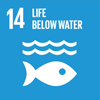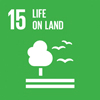A Realization of the FEB UGM Commitment to Sustainability
- Details
- Written by Rizal
- Category: News
- Hits: 624

Behind the romanticism of Yogyakarta, persisting issues are concealed. Waste overshadows the beauty of the region. As of July 2023, the Yogyakarta Regional Government closed the Piyungan Final Disposal Site (TPA) due to the increasing quantity of waste. Approximately 700 tons of garbage enter the Piyungan TPA daily, with food waste dominating at 56 per cent, followed by plastic waste at 24 per cent. This reality highlights the low awareness of Yogyakarta's community regarding waste management.
A Glimpse of Waste Management at FEB UGM
The waste emergency in Yogyakarta solidified the determination of the Faculty of Economics and Business, Universitas Gadjah Mada (FEB UGM), to contribute to waste management. As the sun rises, cleanliness officers stand ready to sweep leaves as the first step in maintaining cleanliness on the faculty's premises. The gathered leaf waste is transported to the leaf waste destruction area. A crusher machine then breaks down the leaf waste into smaller particles. The resulting crushed material is treated with a particular substance to accelerate decomposition and then transferred to storage containers.
The decomposed material undergoes a screening process. The leaf waste is transformed into nutrient-rich organic fertilizer within two to three months. This fertilizer is utilized to create biopores in the Plaza FEB UGM environment. In practice, the fertilizer is mixed with husks and soil before being sprinkled in planted pipes. Like a sustainable cycle, leaf waste contributes to the fertility of biodiversity in the FEB UGM environment.
Not Only Cleanliness Officers, Academicians also Contribute
Cleanliness officers are not the sole actors working towards the green mission of the faculty. All academicians contribute to the waste-free culture aspiration at FEB UGM, from lecturers to students. The faculty has taken small but significant steps to manage waste. Academicians are encouraged to bring tumblers to minimize the consumption of plastic bottles. The Toyagama facility, which provides drinking water services by UGM, serves as a place for academicians to refill their tumblers. Moreover, all waste bins at FEB UGM have been organized into three waste groups: recyclable, organic, and inorganic. As a result, waste sorting and management have become more straightforward.
During the midday sun, at precisely 2 p.m., cleanliness officers empty sorting bins and collect the waste in a transit area. The weight of the waste is measured. Notably, one officer records the weighing results through the Google Form platform to assist the faculty in tracking the daily waste acquisition trends. Afterwards, officers quickly move to the UGM Waste Disposal Depot to transfer organic and inorganic waste. The story is different for recyclable waste processing. Precisely for this type of waste, the weighed waste will not be discarded at the depot but sold to collectors. The proceeds from the sales support various social activities conducted by the cleanliness officers.
On the other hand, FEB UGM also overlooks the problem of food waste. This type of waste is a significant contributor to the emergency waste issue in Yogyakarta, as evidenced by its dominance in the waste composition in the Special Region. The EB Canteen, frequented by students and educational staff, is a real example of a contributor to food waste. The faculty processes this waste into high-quality animal feed, particularly for fish and poultry. Value is created, and the environment is preserved.
Great Hopes for Environmental Sustainability
The efforts undertaken by FEB UGM are tangible actions to support the "Waste-Free UGM" movement. Didi Achjari, Prof. Dr., M.Com., Ak., CA., the Dean of FEB UGM, stated, "In line with FEB UGM's mission to contribute to sustainability, we are committed to implementing a sustainable culture. This is evident in the 'Commit, Sort, and Select Waste' ('Pantang, Pilah, dan Pilih Sampah') movement. These actions create added value from the generated waste."
Regarding inorganic waste, Prof. Didi emphasized FEB UGM's efforts to recycle this type of waste, from paper to plastic. On the organic waste side, FEB also processes food waste into animal feed and leaf waste into organic fertilizer. "Let's create a campus environment that is clean, comfortable, and lush to support sustainability," concluded Prof. Didi.
The contribution from FEB UGM is expected to have a multiplier effect for various parties. Moreover, this action is a concrete manifestation of the faculty's commitment to achieving Sustainable Development Goals (SDG), especially goals number 11 (sustainable cities and communities), 12 (responsible consumption and production), 13 (climate action), 14 (life below water), and 15 (life on land). May the spirit of FEB UGM academicians always prevail in preserving environmental sustainability!
#GoFEBGreen
My workplace is tidy, my campus is clean, and my environment is lush.
Reportage: Rizal Farizi







